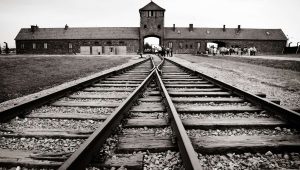“Remembrance in the Living Room” (Zicharon Ba’Salon) is an initiative started in 2011 to have average Israelis open their homes to Holocaust survivors to hear their stories in person where they live. To literally “bring it home” for average Israelis.
The number of Holocaust survivors still with us is dwindling fast, and Israel views it as imperative to hear and record their stories before it’s too late.
This year, in the run-up to Holocaust Remembrance Day, the first to open their living room were President Isaac Herzog and First Lady Michal Herzog, who hosted Ines Nissim, a Greek Jew who managed to flee via Turkey to the Land of Israel when the Nazis invaded.
Ines Nissim was only 14 when the Germans invaded Greece, and told of her family’s escape from Thessaloniki through Turkey to what was then the British Mandate. “When people talk about the Holocaust, they don’t speak about the Holocaust in Greece,” she said, “and sometimes people ask me, ‘Was there a Holocaust in Greece?’” Mrs. Nissim considers it a great calling to tell the story of the destruction of the Jewish community of Thessaloniki.
Ines shared her testimony:
“The Jews of Greece were well integrated: they worked in trade, as doctors, and as newspaper proprietors. It was truly a very colorful community because people spoke many languages, including German and French. When the Germans came in 1941, everything changed. The Jewish girls could no longer go to school. The Christians who went wouldn’t let them study. Moreover, for example, my father had three floors of furniture—they came, cleared it up, and set it to Germany.
“In 1943 they decided that all the Jews must be concentrated in a single big ghetto. Every few days, they started taking some of the Jews, bringing dogs and making them walk to the train station, from which they were sent by railway to Auschwitz. My Ancient Greek teacher at school showed up at our home and told my dad, ‘I don’t know what awaits you, but I’m prepared to take Ines home, and if you don’t return, I’ll save her.’ My father told her, ‘I know that it’s dangerous for you, but if you can take the two girls (we were three sisters), I’ll be able to move and find a way.’ And that’s how she took us. She lived with an old woman who couldn’t be told about this, so she put us in a wardrobe. I want to say that for three days, my sister and I didn’t utter a peep. She used to come back from work in the evening and take us to be fed and go to the bathroom.”
Ines described how her family crossed the border to the Italian-controlled part of Greece on horseback, in an extremely dangerous journey. After the fall of Italy in the war, the Germans took control of southern Greece, including Athens, where the family was staying, and demanded that the Jews register with the authorities, in order to deport them to the extermination camps.
Ines’ family managed to escape to Turkey, a neutral country, with the help of the partisans. After a tiring journey, with the little money they had left, the family managed to escape south, until they reached Aleppo in Syria and from there the Land of Israel. Ines was moved to describe her family’s arrival in the Land of Israel despite the difficult conditions, and the journey to Tel Aviv, where she still lives today.














